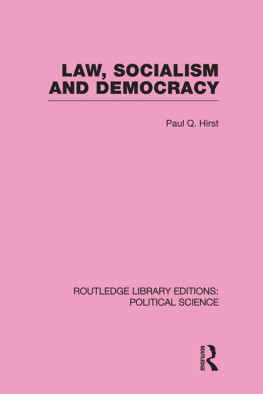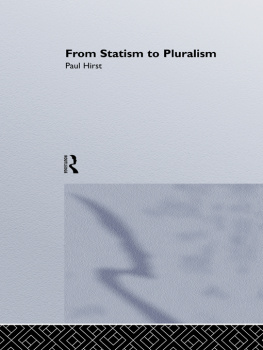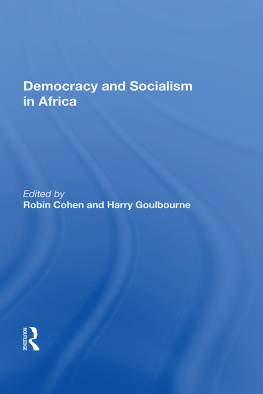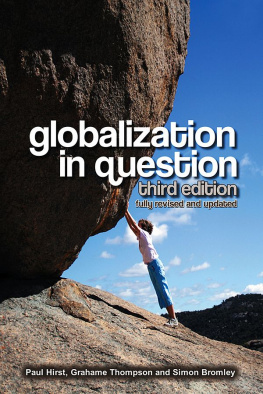Paul Q. Hirst - Law, Socialism and Democracy
Here you can read online Paul Q. Hirst - Law, Socialism and Democracy full text of the book (entire story) in english for free. Download pdf and epub, get meaning, cover and reviews about this ebook. publisher: Taylor and Francis, genre: Politics. Description of the work, (preface) as well as reviews are available. Best literature library LitArk.com created for fans of good reading and offers a wide selection of genres:
Romance novel
Science fiction
Adventure
Detective
Science
History
Home and family
Prose
Art
Politics
Computer
Non-fiction
Religion
Business
Children
Humor
Choose a favorite category and find really read worthwhile books. Enjoy immersion in the world of imagination, feel the emotions of the characters or learn something new for yourself, make an fascinating discovery.
- Book:Law, Socialism and Democracy
- Author:
- Publisher:Taylor and Francis
- Genre:
- Rating:5 / 5
- Favourites:Add to favourites
- Your mark:
- 100
- 1
- 2
- 3
- 4
- 5
Law, Socialism and Democracy: summary, description and annotation
We offer to read an annotation, description, summary or preface (depends on what the author of the book "Law, Socialism and Democracy" wrote himself). If you haven't found the necessary information about the book — write in the comments, we will try to find it.
Law, Socialism and Democracy — read online for free the complete book (whole text) full work
Below is the text of the book, divided by pages. System saving the place of the last page read, allows you to conveniently read the book "Law, Socialism and Democracy" online for free, without having to search again every time where you left off. Put a bookmark, and you can go to the page where you finished reading at any time.
Font size:
Interval:
Bookmark:
Introduction
This book is concerned with the political institutions and the legal framework necessary for a democratic socialism. I have pursued this theme over a number of years in a critical dialogue with Marxism and with liberal political theory. It may appear to be quixotic to pursue it as I do in the mid-1980s when there are so many immediate evils to be confronted - poverty and unemployment, racial oppression and its grim reflection of riot and murder. I see my critics very clearly and they fall into two different categories. I owe both of them an answer and they in turn need to think again and carefully about their own questions.
To the renascent Labour centre all such theorizing is a diversion from the essential task of winning the next election. Theorizing democratic socialism rather than sloganizing it, pursuing the argument into the radical political changes needed for a democratic socialist society, is not only diversionary but dangerous. It offers the Conservative enemy the dangerous radicalism it desperately needs in order to denounce Labour. The boat is always in danger of being rocked and there are always urgent and attainable reforms to be pursued after the next electoral victory. This is not to deny or to belittle the urgency of working for electoral victory today; far from it. It is simply to say that one must have a clear view - not a vision - of the attainable radical changes - not a utopia - that lie beyond the tunnel vision of the next election. Without the political preparation for radical change, the series of nextelections is infinite. Part of that preparation is political theorizing to convert socialism into a specific and practical political doctrine - changing it from an anti-capitalist economic theory and a set of values and political sentiments into an account of a new and superior constitution, of political institutions that permit both democratic accountability and efficient government.
To some of the radical Left, increasingly fragmented and despairing, the idea of building a democratic socialism by the existing democratic means is absurd. They see Britain through an apocalyptic lens: a society crumbling at its very foundations, and a polity so indifferent to suffering that it will eventually be burst asunder by mass protest and resistance. The task is to facilitate that resistance, to aid workers, blacks, women, the peace movements, etc., in their struggles against authority. But the apocalypse never comes; the poor never do inherit the earth, or, less meek and mildly, seize it gun-in-hand. Britain is a land not merely of poverty, unemployment and squalor, but also of comfort and modest plenty for masses of ordinary working people. It is not a citadel of the few bloated rich to be assaulted by the mass of starveling poor. It remains possible, if not likely, to persuade a majority of ordinary people, manual and non-manual workers, that we can tackle the evils of poverty, unemployment and squalor and that we can do so without an authoritarian and regimented society, indeed, that in doing so we can greatly increase the level of accountability and participation.
Since 1848 it has been clear that the poor cannot change things by revolutionary mass struggle; they will be shot to pieces or otherwise contained by the organized forces of repression. Only if the government, army and police are divided and disorganized, if political and social forces are violently polarized in the higher social strata, can revolutionary political change come about. This is what the Marxist-Leninist tradition, which digested thoroughly the lessons of 1848 and 1870-71, called the national crisis. Leninism continued insurrectionary thinking as a viable general political response to the Western world only because it also believed in a general evolution of capitalism that would bring these crises about. If no such general tendency exists then such national crises are adventitious and conjunctural and, therefore, no general political response is possible. In other words, there is no alternative to political struggle with the forces and arenas at hand, which in Western Europe means political parties and electoral competition.
Socialism has known this for a hundred years. It has built political parties and competed in elections, it has assisted in the building of trades unions and the organization of labour, and it has participated in central and local governments to change and reform social conditions. Yet all this time it has been locked into structures of thought and politics (revolution versus reform, utopia versus pragmatism) that deny it the full benefits of its knowledge. It is hard to deny that the construction of a democratic socialism by the existing democratic means is difficult, but both of these opposed positions have perceived it to be impossible. The revolutionaries perceive a world where political means are tainted: representative democracy, formal law and government action are despised as incapable of radical improvement. They therefore cling to the apocalypse and, after it, to a society entirely different from the present one - a society without the state and a democratic life without organized political pluralism. The reformists, in contrast, cleave to existing institutions and the maximum immediate benefits that can be milked from them. Quite rightly, they prefer the lesser evil. But they, too, perceive existing political institutions and forms of social organization as incapable of radical improvement.
Reformist socialists have played a major role in the construction of big government and the institutions of mass welfare. They have been not merely conservative but innovative in using political democracy to change the world. They have built up the activities of state whilst leaving the institutions of democracy largely untouched and unreformed. In consequence, they have helped to reduce the effectiveness of democracy and with it radical action for reform, and thus have exacerbated the reformist dilemma. Radical change now depends on a revitalization of democracy and, therefore, on the reform of political institutions. The agencies of big government need to be made more accountable and responsive to the needs of those they administer. Socialists must therefore now enter the dangerous ground of proposing radical reforms in political institutions - tampering with the constitution as the Conservatives and all other reactionaries will bray.
We can only do this if we believe in and are seen to believe in the basic values of the system we wish to change; that is, in representative democracy, in social pluralism and in legally codified and defended civil rights of opposition and political action. Revolutionaries have despised these things and reformists taken them for granted as part of the status quo. But they are now a threatened part of the status quo. A radical and democratic socialism cannot embrace big government as a neutral and efficient means to its ends nor can it subordinate politics to economic theory. The results of doing so are self-evidently the biggest threats to popular support for socialist politics. Socialism is always challenged in the West by its caricature in the Eastern bloc.
We must start in this process of being seen to be committed to democratic values by abandoning the view of socialism as an economic system entirely distinct in its nature from capitalism, and whose primary values are the efficiency of centrally planned production and the egalitarian fairness of bureaucratically administered non-commodity distribution. This is what we are too often saddled with, this side of the non-political utopia in which scarcity has been abolished. The utopian fairy stories are seldom peddled now for fear of open derision, but we have only just begun to recognize that the central features of the socialism that remains are a liability. People do not need a von Mises to tell them that what is called central planning is not very efficient or a von Hayek to tell them that existing forms of non-commodity distribution do not exhibit much egalitarian fairness either. We need not in consequence swallow that alternative phantom of economic sorcery, the market. Central planning versus markets is as negative and baleful an opposition as revolution versus reform. In fact, the socialist movement has shown a great diversity in its economic thinking and fortunately it continues to do so today. A democratic socialist society must necessarily admit of diverse forms of economic organization and calculation. That is necessary, on the one hand, to avoid the economic pitfalls of economic dogmatism (that is, to allow for the benefits of learning and evolution, competition and adaptation on the part of the diverse economic agents) and, on the other hand, to serve as one of the causes for genuine social differences and alternatives, to give people choices in ways of living.
Font size:
Interval:
Bookmark:
Similar books «Law, Socialism and Democracy»
Look at similar books to Law, Socialism and Democracy. We have selected literature similar in name and meaning in the hope of providing readers with more options to find new, interesting, not yet read works.
Discussion, reviews of the book Law, Socialism and Democracy and just readers' own opinions. Leave your comments, write what you think about the work, its meaning or the main characters. Specify what exactly you liked and what you didn't like, and why you think so.













